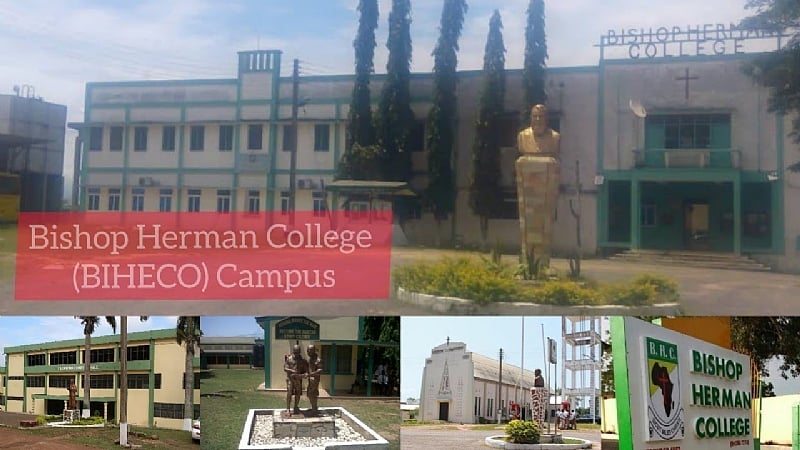Bishop Herman College, once hailed as one of Ghana’s top Catholic senior high schools, nestled in the heart of the Kpando District of the Volta Region, now stands at a crossroads. Founded on the enduring values of faith, discipline, and academic excellence, this prestigious institution has long been a symbol of hope for countless families. It proudly stood shoulder to shoulder with Catholic giants like Kpando Secondary School, St. Augustine’s College, Pope John Senior High, and other elite mission schools across the country.
But today, Bishop Herman College—affectionately known as BIHECO—bears the weight of a disturbing transformation. A haven that once nurtured godliness, intellect, and national pride is now battling an identity crisis fueled by a silent yet devastating enemy: drug addiction
From Chapel Bells to Smoke Trails: What Happened to Bishop Herman?
It is no exaggeration to say that Bishop Herman was once a sanctuary of moral uprightness. Its alumni are scattered across the globe, many in high-ranking positions in business, politics, medicine, law, and religious ministry. They carried the dignity and discipline of their alma mater into the world like a badge of honour.
However, recent trends suggest the erosion of that legacy. A wave of drug abuse among students—including substances like marijuana (popularly known as “wee”), alcohol, cigarettes, red-eye mixtures, and potentially more sinister substances—has begun to cloud the school’s once-shining reputation.
First-hand accounts from friends, colleagues, and fellow passengers reveal a heartbreaking truth: some students begin smoking during their time in school and spiral into deeper addiction after graduation. Some have even reportedly lost touch with reality—losing their sanity and their future, victims not of poverty or ignorance, but of negligence and peer decay.
A Shocking Encounter: A Journey No One Expected
Some months ago, a journey from Kpando to Accra turned into a live illustration of this growing concern. A group of Bishop Herman students boarded the last seats of a public mini-bus. Almost instantly, the air in the vehicle changed—thick with the pungent smell of marijuana and cigarette smoke. Murmurs broke out. Passengers looked around in discomfort and disbelief.
How could students from one of the most respected Catholic institutions exhibit such brazenness and disregard for public decorum? Where was the discipline? The faith-based formation? The self-respect?
Who Is Failing These Boys? The School, The Home, or Society?
The decay we see is not simply a school problem—it is a cultural, institutional, and communal failure. It raises painful but necessary questions:
What has changed in the school’s moral compass? What kind of culture is breeding within the walls of BIHECO now? Where are the mentorship systems, the spiritual guides, the Catholic ethos that once kept such darkness at bay? And what kind of parenting and home environments are these students emerging from?
A generation is perishing in silence while we hold onto the nostalgia of a glorious past. Drug addiction is not just spoiling their lives—it’s spoiling the image of a school that once trained nation-builders.
The Ripple Effects: A Legacy at Risk
When students lose their sense of purpose in school, the ripple effects are massive. Their academics suffer. Their future crumbles. Their peers get influenced. The school’s name drags in the mud. And over time, parents lose trust, donors pull out, and a rich legacy dies an avoidable death.
The transformation from “priesthood preparation and scholarship” to “drug dens and moral decay” is not just alarming—it is tragic.
A Call to Action: Redemption Is Still Possible
Yet, there is hope—because what was once built on strong foundations can be rebuilt. But this demands urgent and intentional action.
Leadership must awaken. The school’s administration, Catholic diocese, and PTA must treat this crisis with the weight it deserves. Drug education, surveillance, and spiritual revival must return to the heart of the school. Reinforce guidance and counselling. A school without emotional and psychological guidance is vulnerable to moral collapse. More trained counsellors, frequent seminars, and mentorships must be introduced. Community involvement. Former students, local churches, and civil society must return to support the school—through visits, mentoring programs, and sponsorships for reform. Peer accountability systems. Prefects, house captains, and club leaders must be trained and empowered to uphold and defend the school’s values. Home training must be questioned. Parents must ask themselves: what values are we instilling in our children before they step into school? What are we reinforcing when they return for vacations?
Conclusion: Let Us Not Bury the Future of These Young Men
Bishop Herman College does not belong to the past—it still holds the potential to lead Ghana in education, ethics, and excellence. But unless we speak up, act boldly, and pray fervently, we will continue to lose generations of promising boys to the allure of smoke and destruction.
Let us not look back ten years from now in regret. The time to reclaim BIHECO’s honor is now.
Bishop Herman College can rise again, but only if all of us—educators, parents, alumni, and concerned citizens—come together to pull these young men out of the flames, before it is too late.


